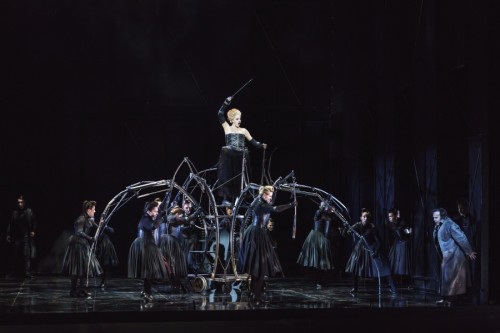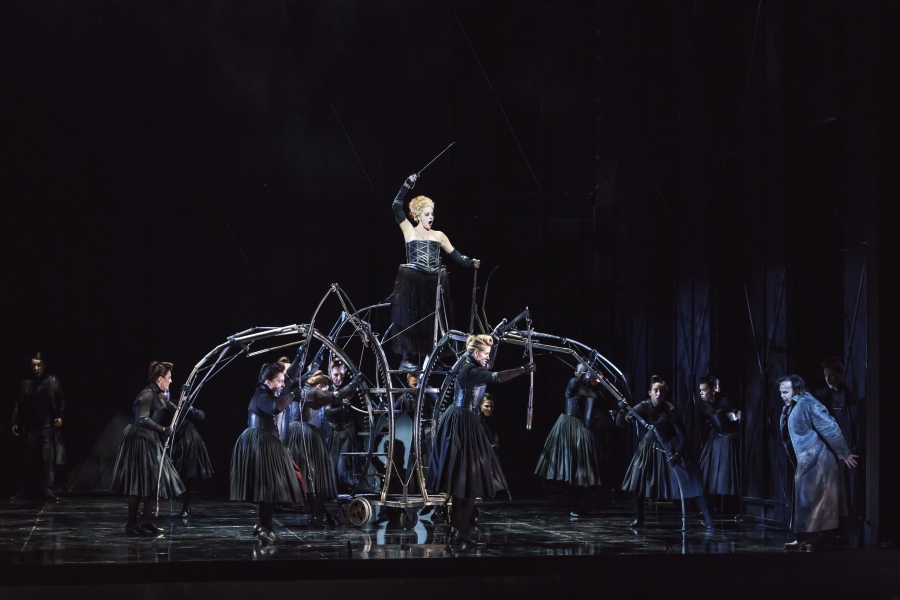 United Kingdom Donizetti, Roberto Devereux: Soloists, Chorus and Orchestra of Welsh National Opera / Carlo Rizzi (conductor), Wales Millennium Centre, Cardiff, 28.2.2019. (GPu)
United Kingdom Donizetti, Roberto Devereux: Soloists, Chorus and Orchestra of Welsh National Opera / Carlo Rizzi (conductor), Wales Millennium Centre, Cardiff, 28.2.2019. (GPu)

Production:
Director – Alessandro Talevi
Designer – Madeleine Boyd
Lighting Designer – Matthew Haskins
Movement Director – Maxine Braham
Cast:
Elisabeth, Queen of England – Joyce El-Khoury
Sara, Duchess of Nottingham – Justina Gringytė
Roberto Devereux, Earl of Essex – Barry Banks
Duke of Nottingham – Biagio Pizzuti
William Cecil – Robyn Lyn Evans
Page – George Newton-Fitzgerald
Gualtiero Raleigh – Wyn Pencarrig
Nottingham’s Confidant – Philip Smith
Donizetti’s Roberto Devereux is a quasi-tragic fantasy superficially masquerading as a historical drama. It has only the vaguest connection with events that ever happened in Elizabethan England. But, after all, one wouldn’t rely on the opera house for historical accuracy, any more than one expects it from the cinema (or, indeed, from some of our popular novelists). Roberto Devereux’s original audience, in October 1837 at the Teatro San Carlo in Naples, would certainly not have worried about questions of historical accuracy. Nor should we, since such concerns can only distract us from what triumphantly is there in the opera – above all an abundance of superb vocal writing, to which the principals in this performance largely did considerable justice.
This Welsh National Opera production was first seen back in 2013 as the last in a set of three Donizetti opera, along with Anna Bolena and Maria Stuarda, under the collective title of The Tudors. It was by some margin the most successful of the three productions – and deserved revival. I don’t dislike Alessandro Talevi’s production to anything like the degree that many others do. If I have a complaint it is that Talevi sometimes rather labours the obvious. In the Early Modern period a powerful controlling ruler was often figured, metaphorically, as a spider at the centre of a web. Elizabeth I was sometimes characterised in such terms. Elizabeth I was, indeed, protected by huge and all-pervasive network of spies and informers. It is no accident that the best modern book on the subject, Stephen Alford’s The Watchers: A Secret History of the Reign of Elizabeth I (2012) should carry as one of its two epigraphs this passage from Jeremy Taylor’s The Rule and Exercises of Holy Dying (1651): ‘Here is no place to sit down in, but you must rise as soon as you are set; for we have gnats in our chambers, and worms in our gardens, and spiders and flies in the Palaces of the greatest Kings’. Wanting to show us how the Queen spins a web in which courtiers and ladies-in-waiting can be caught and devoured, in Act I Talevi illustrates this idea by a kind of illuminated tank on stage, in which we see the silhouette of a spider, to flies are fed. So far, so good. Later, however, this image takes on gigantic and monstrously literal form in the shape of a huge metal spider atop which Queen Elisabetta (Elizabeth) sits, so that it becomes a kind of spider-throne. Exaggeratedly over-literal, no doubt, but it is a memorable piece of stage spectacle. Some of Madeleine Boyd’s costumes are spectacular too – notably for the Queen (with more than a touch, I am told by those who know more about modern fashion than I do, of Vivienne Westwood) – while the chorus, whether as courtiers or ladies in waiting have to settle largely for plain black.
Of the singing one could surely make little serious complaint – and in an opera with relatively little in the way of stage action (Donizetti himself called it ‘an opera of the emotions’) – that was, for me, the most important consideration. The Lebanese born Canadian soprano Joyce El-Khoury was, I think, making debut in this role, and this was only the second time I had had the opportunity to see and hear her live. I have heard her on record and was, of course, aware of her considerable reputation. Initially, I was slightly disappointed, with her voice having an edge of shrillness at its top end; but I soon became fully engrossed in her dramatically intense interpretation. In the later acts she was absolutely convincing, both vocally and in terms of characterisation, creating a queen at the edge of madness as she learned about the limitations of political power and how her emotions can have power over her; now the vocal control was immaculate. Her reading of Elizabeth’s final aria, ‘Vivi, ingrate, a lei acconto’ was positively stunning, a thing of intensely melancholy beauty. A more familiar figure to WNO audiences, the mezzo Justina Gringytė was thoroughly impressive as Sara, Duchess of Nottingham (an entirely fictitious figure, I think). From the very first moments of the opera she stirred one’s sympathy deeply, in ways that were often subtle, with some accomplished singing and some engaging, but restrained, acting. Lithuanian born Gringytė, who studied at the Royal Welsh College of Music in Cardiff, has matured into a fine artist, as she demonstrated very eloquently on this occasion. Her articulation of Sara’s emotions was finely delineated and persuasively intimate.
Of the male principals, I was most excited by Biagio Pizzuti, who was new to me, as the Duke of Nottingham. He has a powerful, but flexible baritone voice, with a good range of colours – in the best Italian tradition. Like Gringytė he made one truly sympathise with his suffering. Barry Banks, as one knows from past experience, never lets the side down in this kind of bel canto repertoire, and he didn’t do so on this occasion; but I have to say that his singing seemed a little more effortful than it has when I have heard him before. Though it is the title role, Roberto must be in some ways an unrewarding role for a singer to take on. He is so dreadfully and consistently confused about his own emotions, and never achieves the kind of self-knowledge that a real tragic hero gains through his suffering, which is one reason why I described Roberto Devereux as ‘quasi-tragic’ at the beginning of this review. Yet the sheer zeal and wholeheartedness of Banks’s singing carried one past the inadequacies and inconsistencies of the manner in which the character was conceived and constructed by Donizetti’s librettist Salvatore Cammerano. (I am not familiar with the play – François Ancelot’s Elizabeth d’Angleterre – on which Cammerano based his libretto, so I don’t know quite how to apportion blame). Lesser roles, such as Cecil (Robyn Wyn Evans) and Raleigh (Wyn Pencarreg) were solidly (and perhaps somewhat stolidly) sung.
With Carlo Rizzi conducting, it came as no surprise whatsoever that the orchestral work was excellent, with an Italianate tang to it. WNO have been fortunate to be able to call on Rizzi for so long in most of their Italian repertoire. The chorus – mostly clothed in black against black backgrounds – was its usual highly competent self, even if this is a work it has little real opportunity to shine.
It must, I feel certain, be a great re-assurance to the principals in a production such as this to know that they can depend on Rizzi and the WNO Orchestra and Chorus (though all three are much more than merely dependable!).
Glyn Pursglove
